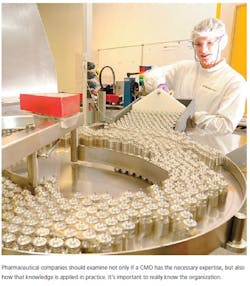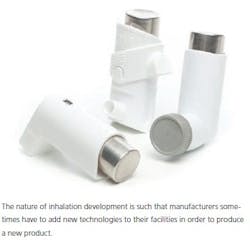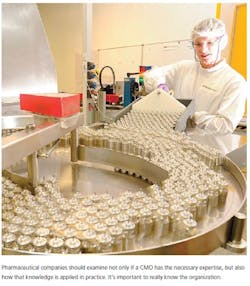It’s no surprise that today’s industry landscape is putting increased pressures on pharmaceutical companies. Shrinking research and development budgets, increased competition and demand from new markets are just a few of the issues that companies face as they work to introduce new inhalation products and ensure the stability of existing ones. Often these issues are complicated even further when outside parties such as contract manufacturing organizations (CMOs) are involved. However, an exceptional CMO can help smooth the way for pharmaceutical companies by providing expertise and industry connections that the company itself may lack. Therefore, choosing a CMO is a critical part in the process of bringing a drug to market.
EXPERTISE
A strong manufacturing partner can give pharmaceutical companies extra assurance that their needs in quality compliance, security, cost targets and product performance will be carefully considered and addressed. In the beginning stages of any manufacturing project, there will inevitably be clear objectives to be met, but a manufacturer’s ability to deal with unforeseen challenges is vital. Pharmaceutical companies should consider a number of qualities in their potential CMOs in order to ensure the best outcomes; following are a few of the most important factors for identifying the right CMO.
This may be one of the most obvious qualifications for a good CMO, but what does the term “expertise” actually encompass? In inhalation manufacturing, an expert CMO should not only have knowledge of the whole development, regulatory and manufacturing process from start to finish, but also experience with global supply chains, including the selection of the correct components such as canisters, valves and dose counters.
Pharmaceutical companies should examine not only if a CMO has the necessary expertise, but also how that knowledge is applied in practice. It’s important to really know the organization. Do the various departments work as silos? Or do they have strong communications links to enable collaboration across every element of production?
No project is the same and this collaboration ensures the ability to address any problems that may occur during the development and scale-up process. Another important factor to understand is how success is defined by the CMO. For example, is it by blind adherence to process or is it outcome-based? An exceptional CMO should not only possess expertise in global development, current regulatory requirements and manufacturing knowledge, but have a proven track record of developing and commercializing inhalation products.
FLEXIBILITY
A good manufacturing partner will understand that every project is different and will be able to adapt its processes in order to meet the goals of each client. A CMO’s willingness to re-examine its standard practices is a good indicator of its ability to work collaboratively with a client. The nature of inhalation development, for example, is such that manufacturers sometimes have to add new technologies to their facilities in order to produce a new product. If a manufacturer is not willing or able to accommodate these needs, this could be a sign that the CMO is not the right fit for a given project.
Flexibility also applies in terms of project deadlines. Pharmaceutical companies should ask prospective CMOs how they marshal resources to meet aggressive deadlines. It’s good to determine if deadlines will be treated seriously and that there is a strong commitment from the manufacturer to meet (or beat) them.
EFFICIENCY
Even when a product is successful, a good CMO proactively reviews its processes to ensure they are as efficient and cost-effective as possible. Pharmaceutical companies should ask manufacturers what operational excellence practices they’ve institutionalized, such as Lean Six Sigma, the well-known OpEx system that helps ensure that processes have been examined and optimized for efficiency. When a practice such as Lean Six Sigma is truly part of the organization’s culture, you can be confident that the prospective CMO’s project leaders will have completed assignments as Black Belts, a strong indicator of a manufacturer’s commitment to the principles.
For projects in which the manufacturer is providing expertise during the development stage, a commitment to design for manufacturability and scale-up (DFMSU) is also a good indicator of a dedication to efficiency. With DFMSU principles, the CMO will work from the very beginning stages of the project to ensure the proposed processes and technologies are well suited for the end stages of manufacturing.
INNOVATION
An expert CMO will provide resources and knowledge to improve a product’s quality while still ensuring regulatory compliance. This kind of proactive innovation helps pharmaceutical companies ensure that their product remains competitive and up to date with industry trends. A strong manufacturer is even able to provide value-added services, such as demonstrating feasibility of product improvement before proposing the solution to the client.
Proactive innovation speaks to the CMO’s ability to keep pace with change and is an important indicator, not only of its financial stability and resources, but also its commitment to ensuring the best relationship with clients. The ongoing push to develop products that are more patient-friendly demands creative thinking from all parties in the pharmaceutical space, and a good manufacturer will be able to provide clients with suggestions and tools to differentiate their products for patients.
COMPREHENSIVE FACILITIES
A CMO should not only have the facilities and resources to do the job as required by the client, but also the ability to react to unexpected conditions such as market shocks, another supplier’s failure or market opportunity. A manufacturer with the resources to deal with the unexpected will have the scale and financial stability to manage suppliers and keep projects moving with minimal setbacks.
Finding the right inhalation CMO can bring pharmaceutical companies value that goes far beyond the financial terms of their contract. The right manufacturer will not only have the industry knowledge to shepherd a project through to completion, but also can provide the stability and industry leverage to keep a project moving when the unforeseen happens. Pharmaceutical executives should not be afraid of asking challenging questions of a potential CMO to ensure that the organization is committed to serving the client and has the resources to act as a true partner.
Published in the December 2013 edition of Pharmaceutical Manufacturing magazine



